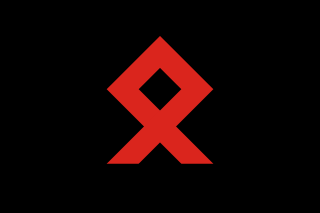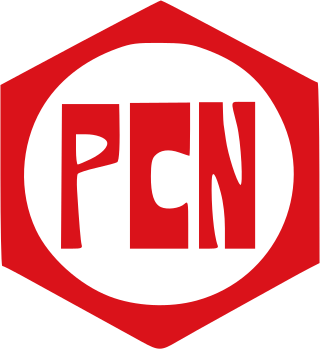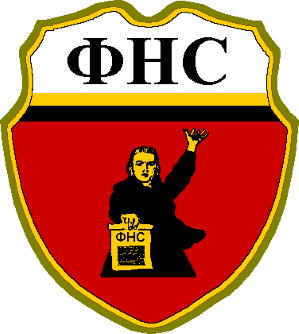Neo-fascism is a post–World War II far-right ideology that includes significant elements of fascism. Neo-fascism usually includes ultranationalism, racial supremacy, populism, authoritarianism, nativism, xenophobia, and anti-immigration sentiment, as well as opposition to liberal democracy, social democracy, parliamentarianism, liberalism, Marxism, capitalism, communism, and socialism. As with classical fascism, it proposes a Third Position as an alternative to market capitalism.

Francis Parker Yockey was an American fascist and pan-Europeanist ideologue. A lawyer, he is known for his neo-Spenglerian book Imperium: The Philosophy of History and Politics, published in 1948 under the pen name Ulick Varange, which was dedicated indirectly to Adolf Hitler and called for a neo-Nazi European empire.

The Socialist Reich Party was a West German political party founded in the aftermath of World War II in 1949 as an openly neo-Nazi-oriented splinter from the national conservative German Right Party (DKP-DRP). The SRP achieved some electoral success in northwestern Germany, before becoming the first political party to be banned by the Federal Constitutional Court in 1952. They were allied with the French organization led by René Binet known as the New European Order.

Strasserism is a strand of Nazism which adheres to revolutionary nationalism and economic antisemitism. It calls for a more radical, mass-action and worker-based movement than what was advocated by the leadership of the Nazi Party. Strasserism derived its name from Gregor and Otto Strasser, two brothers initially associated with this position. Otto Strasser originally led a faction within the Nazi Party, but was expelled from the party in 1930 and created the Black Front as a rival organization. He fled Germany in 1933 and returned after World War II. Strasserism allegedly had a considerable degree of support among the SA, which led to Strasserists being purged by Adolf Hitler during the Night of the Long Knives in 1934, with Gregor Strasser being murdered. In the 1980s, Strasserism again began to play an active role in politics after it found support among some leading members of the National Front party in the UK.

Jean-François Thiriart, often known as Jean Thiriart, was a Belgian far-right political theorist.

The Beast Reawakens is a 1997 book by investigative journalist Martin A. Lee, in which the author discusses old-guard fascists' strategy for survival and the revival of fascism since 1944. Special attention is given to ODESSA actions during the Cold War, international fascist networks, and political inroads to the right-wing mainstream. The book opens with a quotation from T. E. Lawrence's Seven Pillars of Wisdom (1922), a favorite of Hitler's favorite commando, SS-Standartenführer Otto Skorzeny.
Raymond Hill was a former leading figure in the British far right who went on to become a well-known informant. A sometime deputy leader of the British Movement and a founder member of the British National Party, Hill also secretly worked for Searchlight in feeding information about the groups' activities.
Europe a Nation was a policy developed by the British fascist politician Oswald Mosley as the cornerstone of his Union Movement. It called for the integration of Europe into a single political entity. Although the idea failed to gain widespread support for the Union Movement, it proved highly influential on European far-right thought.

The Order of Flemish Militants – originally the Flemish Militants Organisation – was a Flemish nationalist activist group in Belgium defending far-right interests by propaganda and political action. Established in 1949, they helped found the People's Union in 1954, a Belgian political party. The links between the extremist VMO and the VU lessened as the party moved towards the centre. In later decades the VMO would become linked to neo-Nazism and a series of paramilitary attacks on immigrants and leftists before disappearing by the late 1980s.

CEDADE was a Spanish neo-Nazi group that concerned itself with co-ordinating international activity and publishing.

The National Party of Europe (NPE) was an initiative undertaken by a number of far-right political parties in Europe during the 1960s to help increase cross-border co-operation and work towards European unity. Under the direction of Oswald Mosley, a pre-war British fascist leader who returned to politics after the Second World War, the group aimed to bring together and merge a number of far-right groups from across the continent, all of which shared at least some commitment to a wider pan-European nationalism. The group failed to achieve its aims as most of its member groups preferred to maintain their independence.
The Nationalist Front was a minor German neo-Nazi group active during the 1980s.
The Paladin Group was a far-right organization founded in 1970 in Spain by former Waffen-SS Colonel Otto Skorzeny. It conceived itself as the military arm of the anti-Communist struggle during and after the Cold War. It was a private security contractor, the group's purpose was to recruit and operate security contractors to protect anticommunist countries.

The Parti Communautaire National-Européen (PCN) is a Belgium-based political organisation led by Luc Michel, a former member of the neo-Nazi FANE party. A largely National Bolshevik movement, it also has activists in France.
The far right in Switzerland was established in the course of the rise of fascism in Europe in the interwar period. It was a mostly marginal phenomenon in the Cold War period, excepting a surge of radical right-wing populism during the early 1970s, and it has again experienced growth alongside the right-wing Swiss People's Party since the 1990s.
Luc Michel is a Belgian political activist. He is the current leader and founder of the Parti Communautaire National-Européen (PCN). According to research by the BBC and Logically, he is also behind Russosphere, a French-language African social network and fake news network spreading pro-Russian and anti-Western propaganda in Africa.

The National Salvation Front was a broad coalition of communist, socialist, and right-wing nationalist movements against the government of President Boris Yeltsin in Russia. Established in 1992, the FNS was the first group to be banned in post-Soviet Russia before playing a leading role in the 1993 Russian constitutional crisis.

Imperium: The Philosophy of History and Politics is a 1948 book by Francis Parker Yockey, using the pen name Ulick Varange, that argues for a pan-European fascist empire. Imperium presents an antisemitic theory of history, asserts that the Holocaust was a hoax, and is dedicated to "the hero of the Second World War", meant to describe Adolf Hitler.

National Bolshevism, whose supporters are known as National Bolsheviks and colloquially as Nazbols, is a syncretic political movement committed to combining ultranationalism and communism.

Nazi-Maoism was a political movement and ideology that emerged in Italy around 1968 with the formation of a group known as "Struggle of the People". This group of students from the Sapienza University of Rome took heavy inspiration from the writings and theory of Franco Freda and advocated for a combination of ideas from both the far-left and far-right. According to the Neo-Fascist group "Third Position", Nazi-Maoism had a stance of "neither capitalism nor communism, neither reds nor reactionary". Nazi-Maoists such as Freda wanted to form a "Fascist dictatorship of the proletariat" by using the Maoist guerrilla strategy of people's war to overthrow the government and the bourgeoisie.













